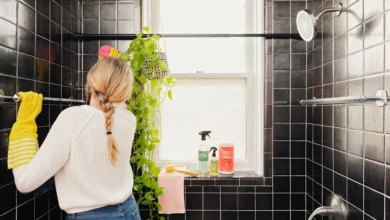How to Remove Heat Stains From Wooden Tables
Just as a preface, you can see the photo below of what my table looked like before using the heat stain remover.
STEP 1: Carefully remove the cloth from the packaging. You may find that there is a little bit of a smell and the cloth feels sort of sticky.
Pro Tip: It comes in a resealable so you can reuse it over and over. So don’t throw it away!
STEP 2: Gently rub the cloth over the heat stain in a circular motion for 1 minute.
After one minute, if the stain is still there, repeat once more. This time using a little more pressure. Rub until the stain disappears.
After that, the heat stain will slowly start to disappear over the next minute or two. My stain fully disappeared after about 2 minutes of rubbing it. I am amazed at the difference that it made.
I am happy I no longer need to use a table runner to hide my heat stains. If you are dealing with heat stains on wood furniture, I highly recommend this easy tip.
It’s simple and cheap. Plus, you can use the cloth again and again. If you have watermark stains, it says it works for that too, although I don’t have any water stains right now, so I can’t confirm it.
Are There Other Ways to Remove Heat Stains From Wood?
I have heard about other tricks such as a DIY mixture using toothpaste and using an iron. However, I haven’t tried those and found this method to be super easy and very cheap!
Common FAQs
What causes white stains on wood tables?
White stains on wood tables are often caused by moisture trapped in the wood’s finish or by heat damage.
Here are a few common causes of white stains on wood:
Water rings: Water rings occur when moisture penetrates the finish of the wood and leaves a white mark. This can happen from placing a wet glass directly on the table surface.
Heat damage: Hot dishes, mugs, or other objects placed directly on the table can cause white marks known as heat stains. These stains are caused by the moisture and heat reacting with the wood’s finish.
Wax or polish buildup: Using certain cleaning products or applying too much wax or polish can lead to a cloudy, white residue on the wood surface.
Mold or mildew: If the white stains have a fuzzy or powdery appearance and are accompanied by a musty odor, it could be a sign of mold or mildew growth. In this case, it’s important to address the underlying moisture issue and consider using a mold and mildew cleaner specifically formulated for wood surfaces.




